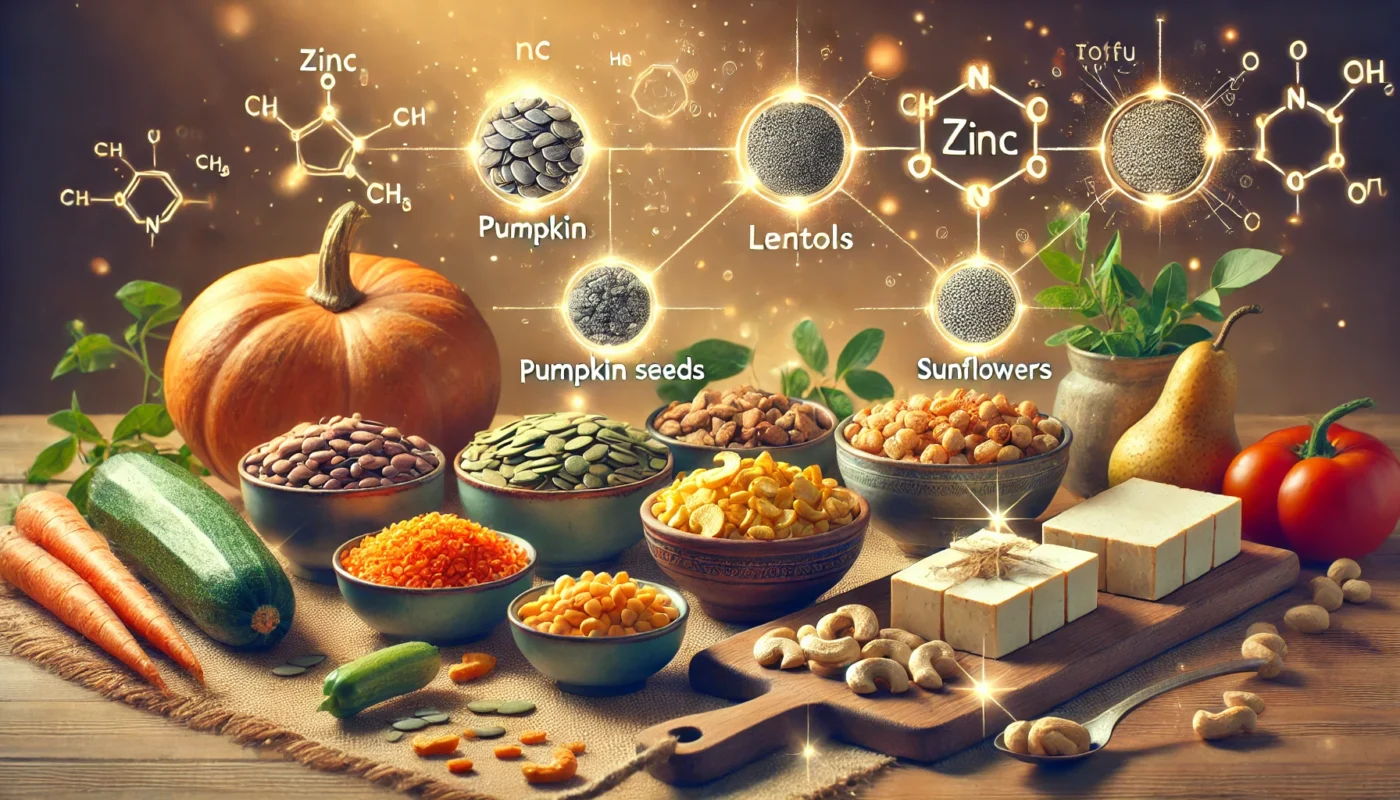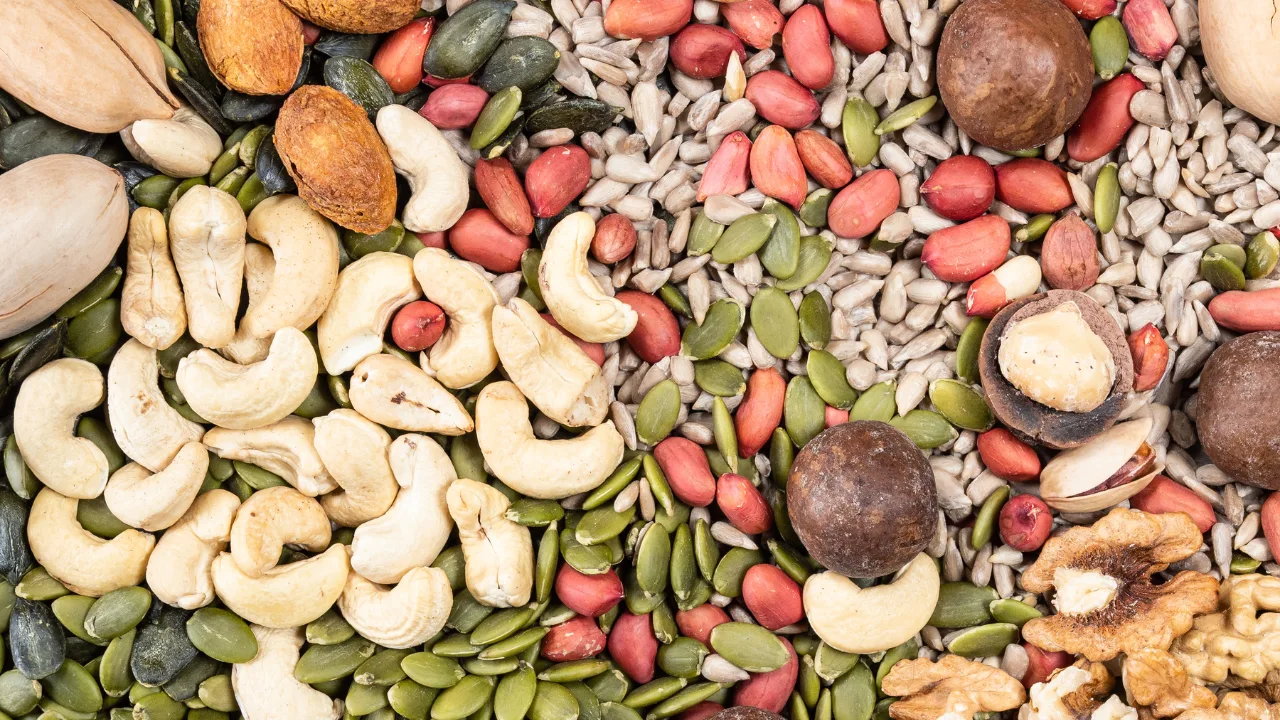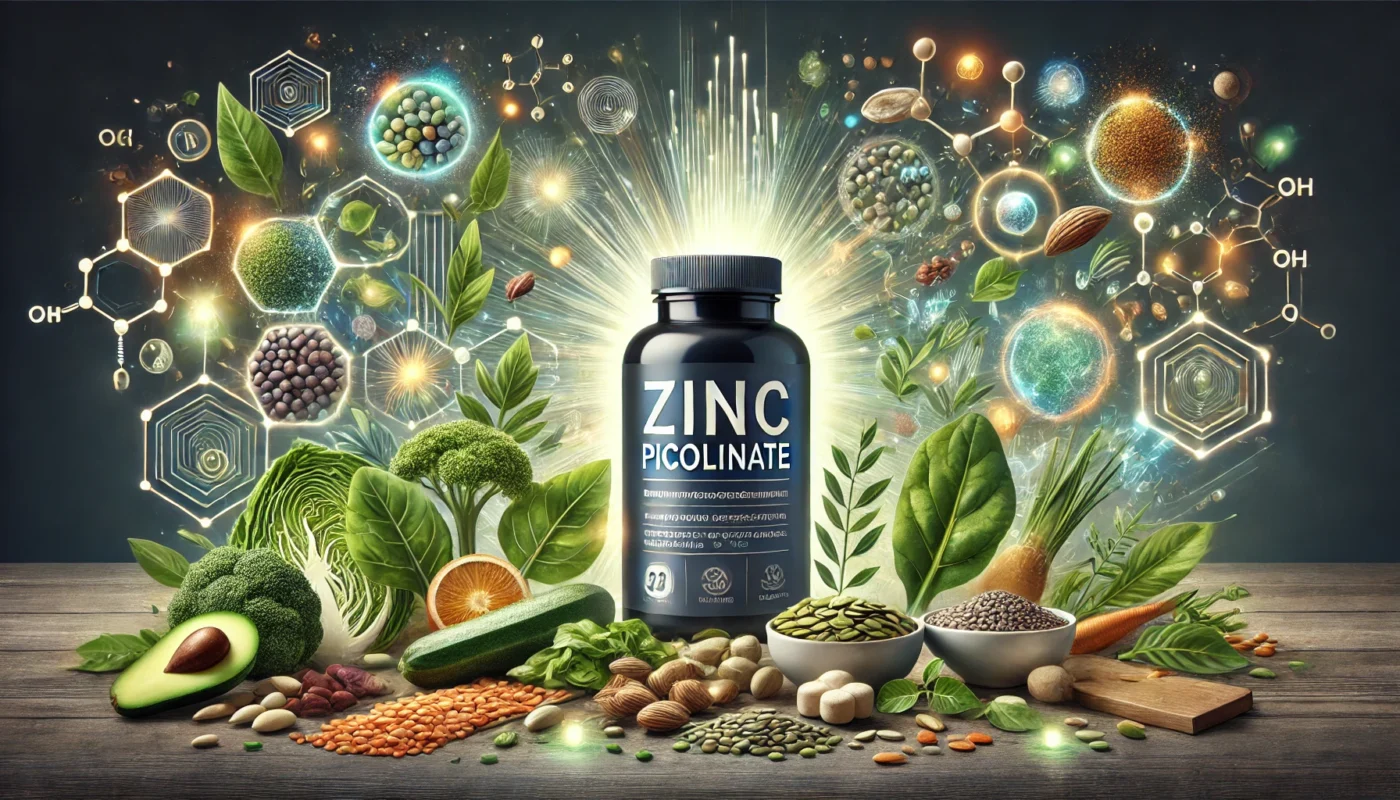Plant-based diets have gained popularity worldwide for their health benefits, ethical considerations, and environmental sustainability. However, vegan diets can sometimes fall short in providing adequate amounts of certain nutrients, including zinc. Zinc is essential for immune function, cellular repair, enzyme activity, and overall well-being, making it a critical component of any diet. Yet, its availability from plant-based sources can be limited due to factors like bioavailability and anti-nutrient content.
Zinc picolinate, a highly absorbable form of zinc, offers a practical solution for vegans to meet their zinc needs efficiently. This article explores the importance of zinc in plant-based diets, the challenges vegans face in obtaining sufficient zinc, and why zinc picolinate is a superior supplementation choice.
You May Also Like:
Zinc Picolinate and Skin Elasticity: Could It Be the Key to Healthier Skin?
The Role of Zinc Picolinate in Enhancing Protein Synthesis
Zinc Picolinate for Vegans: Why It’s an Essential Addition to Plant-Based Diets is an original (HSLHealing) article.
Why Zinc Is Critical for Health
Zinc is a trace mineral involved in over 300 enzymatic reactions in the body, influencing processes such as:
- Immune Function: Zinc is crucial for the activation of T-cells, which protect the body from infections.
- DNA Synthesis and Cellular Repair: Zinc aids in cell division and tissue regeneration.
- Skin Health and Wound Healing: Zinc supports collagen production and reduces inflammation in skin tissues.
- Cognitive Function: Zinc contributes to neurotransmitter function and brain health.
- Reproductive Health: Zinc plays a role in hormone regulation, including testosterone and estrogen balance.
Zinc Requirements and Risk of Deficiency in Vegans
Recommended Dietary Allowances (RDA) for Zinc
- Men: 11 mg/day
- Women: 8 mg/day
- Pregnant Women: 11 mg/day
- Breastfeeding Women: 12 mg/day
Vegans may require up to 50% more zinc than the RDA because plant-based sources of zinc are less bioavailable due to anti-nutrients like phytates, which inhibit zinc absorption.

Why Are Vegans at Risk of Zinc Deficiency?
- Low Bioavailability of Plant-Based Zinc:
Zinc in plant foods is often bound to phytates, compounds found in legumes, whole grains, and seeds, which reduce zinc absorption. - Limited Food Sources:
While some plant-based foods contain zinc, they are generally less concentrated compared to animal-based sources like red meat and shellfish. - Increased Nutrient Demands:
Pregnant or breastfeeding vegan individuals and athletes may have higher zinc requirements, increasing the risk of deficiency. - No Fortified Foods or Supplements:
Many vegans rely solely on whole foods and may not consume fortified products or supplements, further compounding zinc insufficiency.
Signs of Zinc Deficiency
- Weakened immunity and frequent infections
- Delayed wound healing
- Hair thinning or loss
- Dry skin or acne
- Fatigue and difficulty concentrating
Statistics:
- A study in Journal of Nutrition reported that 26% of vegans were at risk of zinc deficiency compared to 11% of omnivores.
- Research in Nutrients found that vegans typically consume 20–30% less zinc than omnivores, increasing their susceptibility to deficiency-related health issues.

Zinc-Rich Foods for Vegans
While vegan diets can include zinc-rich foods, their bioavailability is limited. Examples of plant-based sources of zinc include:
- Legumes: Lentils, chickpeas, and black beans
- Whole Grains: Quinoa, oats, and brown rice
- Nuts and Seeds: Pumpkin seeds, hemp seeds, sunflower seeds, and almonds
- Fortified Foods: Cereals, plant-based milk, and nutritional yeast
Overcoming Anti-Nutrients
To improve zinc absorption from plant-based foods, vegans can:
- Soak, sprout, or ferment grains, legumes, and seeds to reduce phytates.
- Pair zinc-rich foods with vitamin C sources (e.g., citrus fruits) to enhance absorption.
- Avoid consuming zinc-rich foods alongside calcium or iron supplements, which can compete for absorption.

Why Zinc Picolinate Is the Best Choice for Vegans
Zinc picolinate is a chelated form of zinc in which zinc is bound to picolinic acid, a natural compound that enhances mineral absorption in the gastrointestinal tract. It is widely regarded as one of the most bioavailable and effective zinc supplements available.
Advantages of Zinc Picolinate for Vegans
- High Absorption Rates:
Zinc picolinate bypasses many of the absorption barriers posed by phytates in plant-based diets. - Gentle on the Stomach:
Unlike some other zinc supplements, zinc picolinate is less likely to cause gastrointestinal discomfort. - Efficient Correction of Deficiency:
For individuals already experiencing zinc deficiency, zinc picolinate works quickly to restore optimal levels. - Convenient and Reliable:
As a supplement, zinc picolinate provides a consistent and measurable dose, ensuring vegans meet their daily requirements.
How Zinc Picolinate Supports Vegan Health
1. Strengthening Immune Function
Zinc enhances the production and activity of white blood cells, which are essential for fighting infections and maintaining a robust immune system.
- Research Insight: A study in Journal of Clinical Nutrition found that zinc supplementation reduced the duration and severity of colds in zinc-deficient individuals.
2. Supporting Skin and Hair Health
Zinc regulates oil production in the skin and promotes collagen synthesis, reducing acne and supporting wound healing.
- Clinical Evidence: Research in Dermatology Research and Practice demonstrated that zinc picolinate supplementation improved acne symptoms in patients with mild to moderate cases.
3. Boosting Cognitive Function
Zinc contributes to neurotransmitter balance and protects brain cells from oxidative stress, improving memory and focus.
- Study Finding: A study in Nutrients found that zinc supplementation improved cognitive performance in individuals with marginal zinc status.
4. Enhancing Reproductive Health
Zinc regulates hormones such as testosterone, which are critical for reproductive health and fertility.
- Evidence: A study in Fertility and Sterility reported that zinc supplementation increased testosterone levels and sperm quality in zinc-deficient men.
5. Reducing Inflammation
Zinc acts as an anti-inflammatory agent by modulating cytokine activity, reducing chronic inflammation associated with conditions like arthritis.
- Study Insight: Research in Biological Trace Element Research showed that zinc supplementation lowered inflammatory markers in individuals with chronic conditions.

Clinical Studies Supporting Zinc Picolinate for Vegan Diets
- Zinc Absorption Comparison (2017):
A study in Journal of Nutrition and Metabolism compared zinc picolinate with zinc sulfate and zinc oxide. Zinc picolinate demonstrated superior absorption and higher serum zinc levels in participants. - Zinc and Immune Health (2018):
Research in American Journal of Clinical Nutrition found that zinc supplementation reduced infection rates in vegan participants with low zinc intake. - Zinc and Cognitive Function (2020):
A clinical trial in Nutrients reported that zinc picolinate supplementation improved cognitive test scores in plant-based dieters compared to a placebo group. - Zinc for Skin Health (2019):
A study in Dermatology Research and Practice found that zinc picolinate reduced acne lesions by 25% over 12 weeks in zinc-deficient vegans.

Recommended Dosage and Safety
Dosage Recommendations:
- Adults: 15–30 mg/day (depending on individual needs)
- Pregnant/Breastfeeding Women: Consult a healthcare provider for personalized recommendations.
Safety Considerations:
Excessive zinc intake (above 40 mg/day) can cause:
- Nausea
- Reduced copper absorption
- Gastrointestinal discomfort
Note: Always consult a healthcare provider before starting supplementation to ensure proper dosing and avoid interactions with other nutrients.
How to Incorporate Zinc Picolinate into a Vegan Lifestyle
- Take with Food: Zinc is better absorbed when consumed with a meal containing protein.
- Combine with Vitamin C: This enhances zinc absorption and supports immune health.
- Monitor Progress: Track improvements in energy levels, immunity, and skin health after supplementation.

Conclusion: Zinc Picolinate as a Vegan Essential
Zinc picolinate is an invaluable addition to a vegan diet, offering a practical solution to address common nutritional gaps. By supporting immune function, skin health, cognitive performance, and overall well-being, zinc picolinate ensures that vegans can thrive without compromising their nutritional needs.
For those adopting a plant-based lifestyle, incorporating zinc picolinate into a daily regimen can provide peace of mind and significant health benefits. As always, consult with a healthcare provider to tailor supplementation to your individual needs and ensure safe and effective use.

References
- Zinc deficiency: a special challenge. Retrieved from: https://pubmed.ncbi.nlm.nih.gov/17374687/
- Zinc Therapy in Dermatology: A Review. Retrieved from: https://pmc.ncbi.nlm.nih.gov/articles/PMC4120804/
- Zinc, Copper, and Iron in Selected Skin Diseases. Retrieved from: https://www.mdpi.com/1422-0067/25/7/3823
- Zinc in Dermatology: Exploring Its Emerging Role in Enhancing Botulinum Toxin Formulations and Clinical Efficacy. Retrieved from: https://www.mdpi.com/1467-3045/46/11/717
- Multiple impacts of zinc on immune function. Retrieved from: https://pubmed.ncbi.nlm.nih.gov/24531756/
- Zinc in human health: effect of zinc on immune cells. Retrieved from: https://pubmed.ncbi.nlm.nih.gov/18385818/
Important Note: The information contained in this article is for general informational purposes only, and should not be construed as health or medical advice, nor is it intended to diagnose, prevent, treat, or cure any disease or health condition. Before embarking on any diet, fitness regimen, or program of nutritional supplementation, it is advisable to consult your healthcare professional in order to determine its safety and probable efficacy in terms of your individual state of health.
Regarding Nutritional Supplements Or Other Non-Prescription Health Products: If any nutritional supplements or other non-prescription health products are mentioned in the foregoing article, any claims or statements made about them have not been evaluated by the U.S. Food and Drug Administration, and such nutritional supplements or other health products are not intended to diagnose, treat, cure, or prevent any disease.

